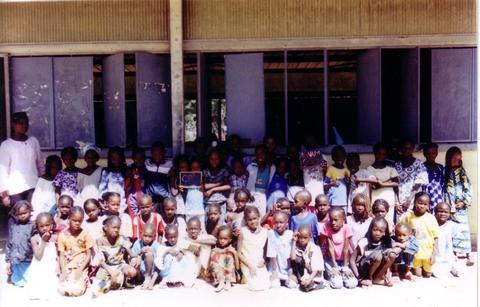Recently, several Senegalese bloggers and journalists have turned their attentions to the challenges of educating children in Senegal.
In an article on the news website PressAfrik [fr], Awa Diédhiou writes that “The Senegalese school is in danger”, because many schools -mainly in Dakar – are close to markets,
L’école sénégalaise est menacée. Beaucoup d’établissements scolaires sont en train de se transformer timidement en un fief de délinquants et l’environnement est de plus en plus carnavalesque. Les enseignements se déroulent dans un fond sonore assourdissant provenant des marchés dont l’animation et l’encombrement permettent aux voyous et aux drogués d'entrer discrètement dans les écoles

Picture of the clasroom of the school of Agnam-Goly, Senegal by Adama Diop, under Wikipedia Commons License.
Naomed, writing [30th of November 2008] on the blog Politique au Sénégal [fr], points another issue :
De 2001 à nos jours, au moins 1 050 cas de grossesses ont été recensés dans les écoles du département de Kolda. […]
Plus de 50% de ces grossesses seraient dues à des enseignants.
From 2001 to present, at least 1,050 pregnancies have been registred in schools of the department of Kolda [an area with 300,000 inhabitants]. […]
Teachers would be responsible of more than 50% of these pregnancies.
With rather coarse words, the author of this post emphazises two important problems.
First, is the lack of sex education in schools, which make girls “gullible”, “good to consummate” and “ignorant about essential matters”. Naomed criticizes religious leaders who are “quick to denounce occidental way of life” and thinks the real sin is ignorance. An ignorance apparently shared by teachers “incapable of using condoms”.
Second, the impunity ot those teachers seducing their pupils. Naomed points out that in most cases, no legal action against them. “People negotiate and sort things out,” Naomed writes. Money changes hands, the matter is forgotten.
L'omerta fonctionne parce qu'un consensus non dit couvre en général ce genre d'actes, tout comme il couvre la corruption, le détournement… C'est la rançon de la difficulté des sénégalais à condamner l'un des leurs. La rançon de la propension des sénégalais à négocier toujours et encore, même le non négociable. La rançon de la tendance des sénégalais à résoudre tous les problèmes avec l'argent.
This sad reality seems to be confirmed by Hamidou Sagna, who writes an article on allAfrica.com [fr] about NGO's and schoolchildren in Hann-Bel Air, a district of Dakar, calling for the end of brutalities, abuses, genital mutilations and rapes against girls. The children wore T-shirts with inscriptions saying “I want to learn without fear”, “My school, a safe place to learn” and “Stop harassing girls”.
A post on Scoops de Ziguinchor [fr] reports the speech of the mayor of Ziguinchor, when he delivered some furniture and stationery for the schools. He was satisfied and told the parents: “You sacrifice yourself for the future of your children. Good choice”. But more surprisingly, he also criticized education:
Toutefois l’édile de Ziguinchor est d’avis que plus les gens sont instruits moins ils regagnent leur village et plus ils tournent le dos à la terre. « Le travail de la terre est aujourd’hui une contrainte. C’est comme qui dirait une punition pour ceux qui n’ont pas pu fréquenter ou réussir à l’école. Cela il faut y réfléchir. Car constituant l’ennemi principal de notre développement économique et social ».
The mayor notes that villages are losing inhabitants; school educates people only for them to migrate to the cities where they face uncertain futures, and often unemployment.
Even so, more and more children in Senegal are going to school. UNESCO figures show that 72% of children attended primary school in 2007. It's progress, but one that creates new challenges and issues.






